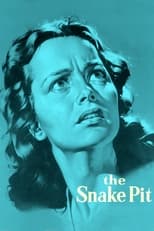John Chard
Nov 2, 2013
9/10
I'll tell you where it's gonna end, Miss Somerville... When there are more sick ones than well ones, the sick ones will lock the well ones up.
The Snake Pit is directed by Anatole Litvak and adapted to screenplay by Frank Partos, Millen Brand and Arthur Laurents from the novel written by Mary Jane Ward. It stars Olivia de Havilland, Mark Stevens, Leo Genn, Celeste Holm, Glenn Langan, Helen Craig, Leif Erickson and Beulah Bondi. Music is by Alfred Newman and cinematography by Leo Tover.
Olivia de Havilland plays Virginia Stuart Cunningham, and film chronicles Virgina's time and treatment in the Juniper Hill Mental Institution.
"It was strange, here I was among all those people, and at the same time I felt as if I were looking at them from some place far away, the whole place seemed to me like a deep hole and the people down in it like strange animals, like... like snakes, and I've been thrown into it... yes... as though... as though I were in a snake pit..."
It's still today one of the most potent and important screen explorations of mental illness and its treatment. Backed by an astonishing performance by de Havilland, Litvak and an initially sceptical Darryl F. Zanuck (20th Century Fox supremo), led the way in bringing to the masses the subject and to treat it with stark realism. Quite often it's harrowing as entertainment, with Virgina's fractured mind laid bare under duress of treatments now seen as antiquated.
It's true enough to say that some of the story features simplistic motives and means, these come as a product of the time the picture was made. But with Litvak (Sorry, Wrong Number) and his principal crew members researching the subject thoroughly, the end result is an incredible blend of dramatic heartfelt suspense and rays of humanistic hope. As Virginia weaves her way through this maze of psychological discord, with flashbacks constantly adding layers to the character's make up, Litvak presents a fascinating portrait of asylum life and the people who resided there, both as patients and staff.
Some scenes are brilliantly crafted, either as visual expansions of the story or as shards of light in a dark world. One sequence sees Litvak track "dancing" silhouettes on a wall, and to then do a pull away shot upwards to reveal Virginia in the snake pit, the impact is stark in its magnificence. Another sequence takes place at a dance for the patients, where a rendition of Antonín Dvorák's "Goin' Home" turns into something quite beautiful, a unison of profound optimism that strikes the heart like the calm after a storm.
Leo Tover's (The Day The Earth Stood Still) crisp black and white photography is perfectly in sync with the material, and Newman's (Wuthering Heights) magnificent score bounces around the institution like a spectral observer. With de Havilland doing her tour de force, it could be easy to forget the great work of Genn and Stevens, the former is a bastion of assured calmness as Dr. Mark Kik, the latter as Virgina's husband Robert underplays it to perfection and he gives us a character to root for wholesale.
It has to be viewed in the context of the era it was made, but its influence on future movies and awareness of mental health treatments in the real world should not be understated. A brilliant production that demands to be seen. 9/10
